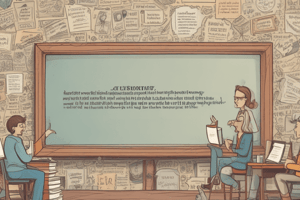Podcast
Questions and Answers
Match the vocabulary words to their definitions:
Match the vocabulary words to their definitions:
Assess = To evaluate or judge the quality, importance, or value of something. Bias = Systematic error or deviation from the truth in judgment or decision-making. Conclusion = A final decision or judgment reached after consideration of the facts. Causation = The relationship between cause and effect, where one event leads to another.
Match the following vocabulary words with their related concepts:
Match the following vocabulary words with their related concepts:
Abstract = A summary of the key points of a larger work. Citation = A reference to a source of information. Comprehend = To understand the meaning of something. Correlation = A statistical relationship between two variables that change together.
Match the vocabulary words with their usage in academic context:
Match the vocabulary words with their usage in academic context:
Debate = A formal discussion of opposing viewpoints. Data = Facts, statistics, or information collected for analysis. Analyze = To examine something in detail for explanation. Critique = A detailed analysis or assessment of something.
Match the vocabulary terms with their function in education:
Match the vocabulary terms with their function in education:
Match the following terms with their meanings:
Match the following terms with their meanings:
Match the educational vocabulary with their descriptions:
Match the educational vocabulary with their descriptions:
Match the vocabulary words with their appropriate contexts:
Match the vocabulary words with their appropriate contexts:
Match each vocabulary term with the appropriate academic action:
Match each vocabulary term with the appropriate academic action:
Match the following terms with their definitions:
Match the following terms with their definitions:
Match the research concepts with their correct descriptions:
Match the research concepts with their correct descriptions:
Match the academic terms with their meanings:
Match the academic terms with their meanings:
Match the following academic concepts with their applicable fields:
Match the following academic concepts with their applicable fields:
Match the following educational levels with their descriptions:
Match the following educational levels with their descriptions:
Match the following items related to writing with their functions:
Match the following items related to writing with their functions:
Match the following scientific terms with their meaning:
Match the following scientific terms with their meaning:
Match the research activities with their corresponding objectives:
Match the research activities with their corresponding objectives:
Study Notes
Essential English Vocabulary For Higher Education
- Abstract: A brief summary of the main points of a longer piece of writing, often found at the start of academic papers.
- Academic: Relating to education, scholarship, or formal study, particularly at a higher level.
- Analysis: A thorough examination of something to understand its nature, significance, or meaning.
- Analyze: To examine something carefully, usually to explain or interpret it.
- Argument: A reasoned and logical presentation of ideas or information aimed at persuading others.
- Assess: To evaluate or judge the quality, importance, or value of something.
- Assumption: A belief or idea taken for granted without proof or evidence.
- Bias: Systematic error or deviation from the truth in judgment or decision-making often influenced by personal beliefs or preferences.
- Causation: The relationship between cause and effect, where one event directly results in another.
- Citation: A reference to a source of information in a scholarly work, acknowledging the original author.
- Comprehend: To understand the meaning or significance of something.
- Concept: An abstract idea or general notion.
- Conclusion: A final decision or judgment reached after considering all the evidence or facts.
- Correlation: A statistical relationship between two or more variables that tend to change together, though not necessarily cause and effect.
- Criterion: A standard or principle used to judge or evaluate something.
- Critique: A detailed analysis or assessment of something, often for evaluation purposes.
- Data: Facts, statistics, or information collected for analysis and interpretation.
- Debate: A formal discussion of opposing viewpoints on a particular topic.
- Demonstrate: To show or prove something clearly and convincingly.
- Due Date: Deadline for completing or submitting tasks, assignments, payments or obligations. crucial for timely fulfillment.
- Education Integrity: Upholding honesty, ethics, and fairness in academic pursuits, including avoiding plagiarism, cheating, and falsification of data.
- Empirical: Based on observation or experience instead of theory or pure logic.
- Ethics: The moral principles or values that govern human behavior, especially in academic or professional contexts.
- Evaluate: To assess or determine the value, importance, or quality of something.
- Evidence: Information or facts that support a claim, conclusion, or hypothesis.
- Examine: To inspect or scrutinize something closely.
- Experiment: A scientific procedure undertaken to make a discovery, test a hypothesis, or demonstrate a known fact.
- Fallacy: A mistaken belief or deceptive argument that appears logical but is not based on sound reasoning.
- Hypothesis: A proposed explanation for a phenomenon that can be tested through research and experimentation.
- Interpret: To explain or understand the meaning of something.
- Investigate: To carry out a systematic inquiry or examination into something.
- Literature: The body of written works, especially scholarly or academic writings.
- Methodology: The systematic approach or set of methods used in a particular area of study or activity.
- Paradigm: A typical example or pattern of something; a framework of understanding.
- Peer Review: The evaluation of scholarly work by experts in the same field before publication.
- Perspective: A particular way of viewing things or interpreting events.
- Phenomenon: A fact or event that can be observed or experienced, often the subject of scientific investigation.
- Plagiarism: Presenting someone else’s work, ideas, or words as your own without proper attribution, violating academic integrity.
- Principle: A fundamental truth or proposition serving as the foundation for a system of belief or behavior.
- Qualitative: Relating to or involving the qualities of something rather than its quantity or amount.
- Quantitative: Relating to or involving the measurement of quantity or amount.
- Reliability: The consistency or stability of a research study’s results over time and across different conditions.
- Research: Systematic investigation or study aimed at discovering new knowledge or understanding.
- Synthesis: The combination of separate elements or ideas to form a coherent whole.
- Synthesize: To combine different elements or ideas to form a coherent whole.
- Tertiary: Education level beyond secondary, includes universities, colleges, vocational schools, and focuses on advanced learning and specialization.
- Theory: A system of ideas intended to explain something, typically based on principles or evidence.
- Thesis: The main idea or argument of a piece of writing, often found in academic essays or papers.
- Validity: The extent to which a research study accurately measures what it claims to measure.
- Variable: A factor or element that can change or vary in an experiment or study.
Studying That Suits You
Use AI to generate personalized quizzes and flashcards to suit your learning preferences.
Description
Test your knowledge of essential vocabulary for higher education with this quiz. Focused on academic terms and their definitions, this quiz will enhance your understanding of concepts critical for higher learning. Perfect for students preparing for advanced studies.



